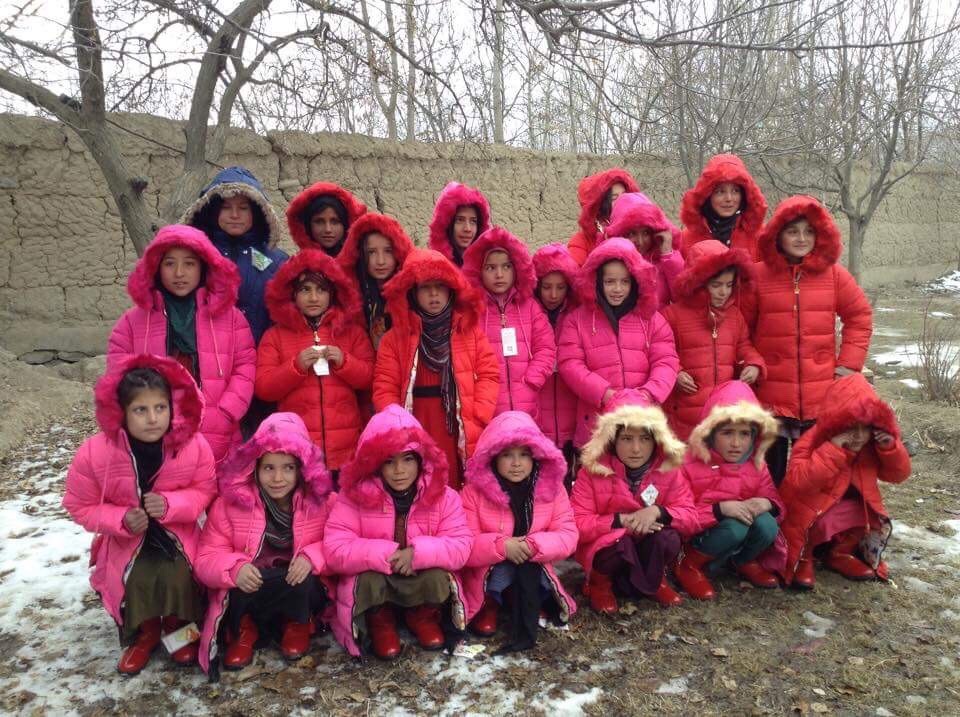Imagine attending school this way – outside – for the entire school year, including the bitterly cold months of winter. What child is so committed to education that s/he would endure this? Sadly, that is the plight of girls in rural Badakshan Province in Afghanistan. There, a school for boys was built nearly a century ago – at a time when only boys attended school. Today, girls are allowed to attend school, but in this deeply conservative society, not the same school as the boys. Sadly, the province has no money to build a matching school for girls. If they are to learn the fundamentals of reading, writing, and arithmetic, the girls must do so outdoors – on park benches, often in the bitter cold!
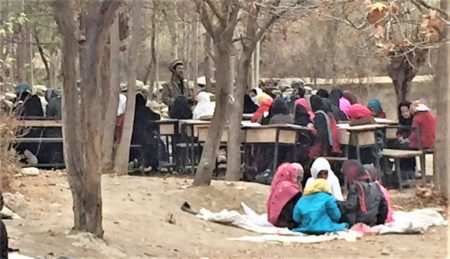
Metra, our local contact in Badakshan Province, sent us an email. The girls are freezing, she told us. Their first semester exams are coming up, and they study outside all day — in thin clothes and worn shoes, sometimes with snow on the ground. They desperately want to pass their exams, she said, but they need warm clothes.
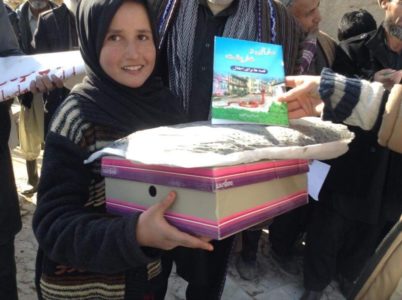
We at the Gendercide Awareness Project were deeply touched. We sent a small sum, and Metra purchased warm coats, boots, heavy socks, and a book for each girl. The gift cost us so little, yet it enabled these wonderful girls to stay in school and pass their exams. Sometimes a small act of generosity has an outsized impact, disproportionately benefiting the life of someone so worthy and needy.
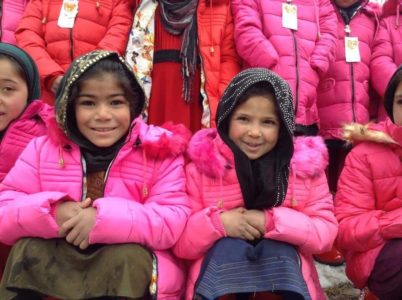
Around the world, more children attend school than ever before – that’s the very good news. Yet, as overall enrollment climbs, the educational gender gap persists. At every level, from primary school through upper secondary school, more boys than girls attend school, with the gap widening in the upper levels.
Given this educational gender gap, the Gendercide Awareness Project views October 11, the upcoming International Day for the Girl Child, as an under-utilized asset waiting to be tapped. It is the perfect platform to promote “girl causes”: higher education, quality STEM instruction, an end to child marriage, sexual and reproductive health, and familiarity with women’s rights, particularly in relation to domestic violence. All of these involve education of some type. Education is the single most powerful gift we can give a girl – no question! It is also the best, and arguably only, solution to the injustice my team and I combat – female genocide or “gendercide.”
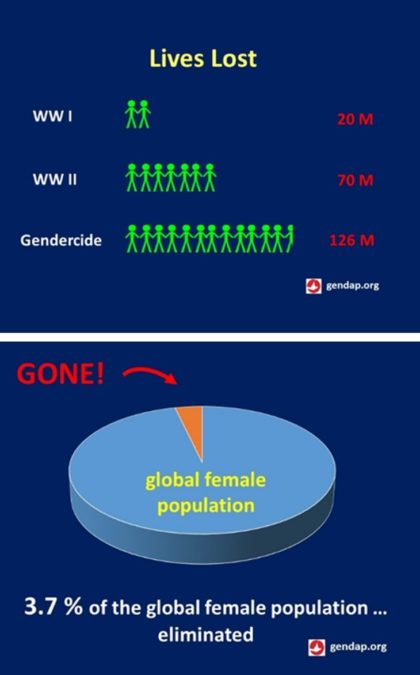 Gendercide is the atrocious and intolerable process of eliminating females from our world through social causes. 126 MILLION women and girls are “missing” (dead) from the world population due to severe discrimination and lack of basic human rights – man-made causes. That figure amounts to 3.7% of the global female population – a staggering loss! Gendercide has caused more deaths than World War I and World War II combined. Those figures, reported by the United Nations Population Fund, derive from academic, scholarly demographic research. Gendercide is the largest atrocity the world has seen, rivaled only by the genocide of the First Peoples, or Native Americans. Astonishingly, very few people appreciate the scale of gendercide, just as I was similarly unaware a dozen years ago.
Gendercide is the atrocious and intolerable process of eliminating females from our world through social causes. 126 MILLION women and girls are “missing” (dead) from the world population due to severe discrimination and lack of basic human rights – man-made causes. That figure amounts to 3.7% of the global female population – a staggering loss! Gendercide has caused more deaths than World War I and World War II combined. Those figures, reported by the United Nations Population Fund, derive from academic, scholarly demographic research. Gendercide is the largest atrocity the world has seen, rivaled only by the genocide of the First Peoples, or Native Americans. Astonishingly, very few people appreciate the scale of gendercide, just as I was similarly unaware a dozen years ago.
Gendercide springs from the extreme and widespread devaluation of women – from deep-seated cultural practices rooted in the conviction that women are disposable. Its mere existence demoralizes women everywhere. And yet, there is cause for hope. The fact that gendercide is a socially created problem means that it is a fixable problem. With this in mind, our Gendercide Awareness Project, focuses on:
- Raising awareness, particularly through our traveling art exhibit;
- Taking action by educating at-risk girls in developing countries.
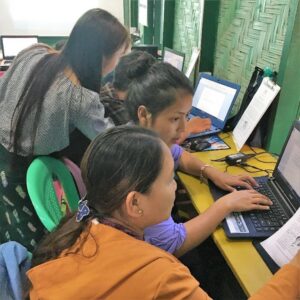
With education and job skills, girls are transformed from economic burdens to valuable economic assets. This welcome transition undercuts one of the major causes of gendercide – the belief that girls will never bring income to their families and never support their parents in old age. Equally important, education steers a girl away from the most terrible thing that could befall her – sex trafficking.

In Myanmar, our partner Educational Empowerment works with the daughters of poor families in the North, a region of persecuted ethnic minorities, to prevent sex trafficking. For too long, traffickers in Northern Myanmar have lured girls into the sex trade with promises of high-paying jobs in neighboring countries. The girls lack skills for good jobs close to home, and in their naiveté, they jump at opportunities promised by the traffickers.
With support from the Gendercide Awareness Project, Educational Empowerment (EE) just launched an intensive digital training program. Each girl receives three months of instruction in Microsoft Office, English, and business presentation skills.
Below, student Phyo-Phyo presents her final research project – a PowerPoint presentation, delivered in English, on literacy in Myanmar. EE is tracking its graduates to evaluate their success in landing good jobs close to home.
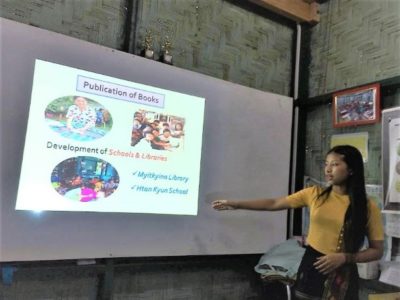
When we educate a girl, we change the arc of her entire life.
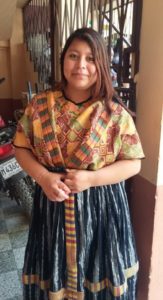
Please pause for a moment and recall your own adolescence. For most of us, adolescence was a time when our worlds expanded. We tried new activities and pursued passions. We went to school, we learned, we traveled, we explored. Most importantly, we began to take control of the important things in our lives – college, jobs, friends, dating.
But for so many girls overseas, just the opposite occurs. When they reach adolescence, their world closes in on them. Instead of gaining control of the important things in their lives, they lose control. They lose their freedom, too. At a time in life when young people long to socialize and be together, girls are confined and chaperoned to ensure their modesty and purity for a future husband. For girls like this, all paths point to marriage and a life of limited horizons – like that of their mothers.
Education delays marriage and allows these girls to develop into young women. It allows them to dream bigger and create futures that their mothers never could have imagined. All six of our education partners combat pressure from parents who want to pull their girls out of school and marry them off – because they can’t afford school fees, because they want one less mouth to feed, or because they fear that their daughters will lose their virginity. The girls, just like you and me, desperately want to remain in school; they understand that school will bring them a tomorrow with a higher standard of living and a measure of autonomy unthinkable for their mothers.
 Consider Vanesa, one of our sponsored students at Miguel Angel Asturias Academy in Guatemala. Vanesa missed two years of school because her parents could not afford school fees. Now on scholarship, she prizes the opportunity to complete her education. Vanesa writes:
Consider Vanesa, one of our sponsored students at Miguel Angel Asturias Academy in Guatemala. Vanesa missed two years of school because her parents could not afford school fees. Now on scholarship, she prizes the opportunity to complete her education. Vanesa writes:
“I am very grateful to those who are helping me. I want to show everyone that the help I am getting is worth it. One of my greatest dreams is to be a great doctor, so I can help those who need it and do not have the means to pay for medicine …
“Thank you for making me so happy and for all the support, for giving me the opportunity to study and helping me get closer to realizing my dreams. Thank you for being people that love to help others. Thank you!”
This October, on the International Day of the Girl Child, we will once again raise funds to keep all these girls in school. Girls in developing countries enter a dangerous and hostile world. Gendercide, trafficking, and child marriage threaten girls far more than boys and can blight a girl’s life just as it begins. So please, this year on the International Day for the Girl Child, educate a girl, and give her a bright tomorrow!
Other articles you may be interested in:
- What’s stopping you? When the hits kept coming, graduate and mom of four stayed focused on her goal by Tarrant County College (TCC)
- In The Bag: Love Sewn Into Every Handmade Product by Fort Worth Business Press
- International Spotlight: Filiz Odabas-Geldiay by Patricia Montella
- The Secret Of Volunteering: Giving Or Receiving?? by Cindy Carter

